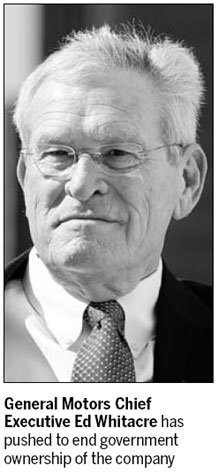Investment
GM IPO to reduce govt stake
By David Welch and Michael Tsang (China Daily)
Updated: 2010-08-20 13:36
 |
Large Medium Small |
Automaker to return to public markets one year after bailout
SOUTHFIELD, Michigan - General Motors Co filed for an initial share offering that will mark the return of what was once the world's largest automaker to public markets a year after it was bailed out by the government.

GM, 61 percent owned by the US Treasury, didn't disclose the number of shares that will be sold in the initial public offering or the price in a statement filed with the Securities and Exchange Commission.
The automaker won't sell any common shares itself while offering preferred shares alongside the IPO, the filing showed. The government will sell some of the common shares it owns in GM, according to the filing.
|
 |
|
||||
"It's important that they retake the legitimacy and prove that they can be a viable private company," said Peter Sorrentino, who helps oversee $13.3 billion at Huntington Asset Advisors in Cincinnati. "It eliminates a reason to say no to their product."
GM may hold the IPO in November, people familiar with the matter have said. The aim is to sell a fifth of the Treasury's 304 million shares, people said in June, cutting the government's stake to less than 50 percent.
The Treasury said in a statement it will retain the right to determine how much of the government's holding will be included in the initial sale. The US has about $42.2 billion invested in the automaker's common equity, according to a senior official in President Barack Obama's administration.
For the government to break even, GM's shares must be worth at least $69.4 billion, and even more if the bondholders and United Auto Workers union exercise warrants for 106 million shares at strike prices from $30 to $126.92 apiece, according to the company's filing and data compiled by Bloomberg.
That's more than three times GM's stock-market value at the end of the last bull market in US stocks and 65 percent higher than Ford Motor Co's current capitalization of $42 billion.
At current bond prices, GM's implied equity value is about $50 billion, data compiled by Bloomberg show.
On a per-share basis, the government would fully recover its investment by selling its 304 million shares at an average price of about $139 each, the data show.
$16 billion sale
"As much as Treasury should and will want a high price, Treasury will want these shares to trade well in the aftermarket so they can come back with offerings and continue to sell down their position," said Steven Rattner, former head of President Obama's Automotive Task Force.
A $16 billion IPO would be the second-largest in US history behind San Francisco-based Visa Inc's $19.7 billion deal in March 2008, data compiled by Bloomberg show. The filing comes after eight of the last nine American companies to complete their initial offerings took discounts to sell their shares, while 40 percent of the IPOs this quarter have left buyers with losses, data compiled by Bloomberg show.
GM's past dominance of US auto sales has shrunk steadily since its market share peaked at 51 percent in 1962. Since 2002, when the company's share of new vehicle sales in the US was 28.4 percent, it's fallen every year to just 19.2 percent this year through July.
Not since 1925
The last time GM accounted for a smaller share of new US vehicle sales on an annual basis was in 1925, according to data from trade publication Automotive News.
Whitacre, 68, said last week that he would step down as CEO of GM on Sept 1 and as chairman at the end of the year, ceding both titles to Dan Akerson, a managing director of the Carlyle Group. Akerson, 61, has been on GM's board since July 2009 and previously served as chairman and CEO of XO Communications, Nextel Communications and General Instrument Corp.
The company last week reported second-quarter net income of $1.54 billion as vehicle sales and production increased. Profit rose 44 percent from $1.07 billion in the first three months of the year. Revenue increased 44 percent from a year ago to $33.2 billion on growing sales of the Buick Excelle in China and Chevrolet Equinox in the US.
The automaker's European operations continued to drag down GM's overall results with a $160 million loss. The unit lost $506 million in the first quarter.
General Motors Corp. filed for Chapter 11 bankruptcy protection on June 1, 2009, after posting $88 billion of losses since 2004, the last year the company reported an annual profit. General Motors Co emerged 39 days later.
Morgan Stanley, JPMorgan Chase & Co, Bank of America Corp and Citigroup Inc will lead the offering, the filing showed. Barclays Plc, Credit Suisse Group AG, Deutsche Bank AG, Goldman Sachs Group Inc, Royal Bank of Canada and UBS AG were also listed as underwriters on the prospectus.
Goldman Sachs didn't get a top role even after the New York-based securities firm offering to accept a fee of 0.75 percent, which was then imposed by the government on all underwriters, people familiar have said.
GM's common shares will be listed on the New York Stock Exchange under the ticker GM and the Toronto Stock Exchange under a ticker that has yet to be determined.
Bloomberg News


